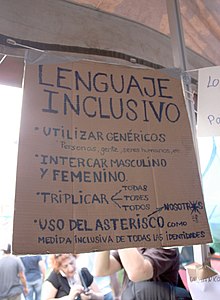
Back Inklusive Sprache German Lenguaje inclusivo Spanish Langage inclusif French Inclusief taalgebruik Dutch Inkluderende språk NB Linguagem inclusiva Portuguese Kapsayıcı dil Turkish

Inclusive language is a language style that seeks to avoid expressions that its proponents perceive as expressing or implying ideas that are sexist, racist, or otherwise biased, prejudiced, or insulting to particular group(s) of people; and instead uses language intended by its proponents to avoid offense and fulfill the ideals of egalitarianism, social inclusion and equity. It's aim is bias-free communication, that attempts to be equally inclusive of people of all ethnicities, gender identities, sexual orientations, religious affiliations, abilities, and ages by communicating in a way that makes no assumptions about the receiver of such communication.[1][2][3][4]
Its supporters argue that language is often used to perpetuate and spread prejudice and that creating intention around using inclusive language can help create more productive, safe, and profitable organizations and societies.[5] The term "political correctness" is sometimes used to refer to this practice, either as a neutral description by supporters, by commentators in general, or with negative connotations by its opponents.[6] Use of gender-neutral terminology has been controversial in languages where "all grammar is gendered", such as Spanish, French, Italian, Portuguese, and German; some areas have banned its use.[7]
Inclusive language is usually adopted by following a language guide that lists words and expression not to use and substitutes for them. Language guides are used by many organizations, especially non-profits (at least in the United States).[8]
- ^ Messner, Lindsey. "Why and How to Communicate with Bias-Free, Inclusive Language". Harris and Associates. Harris and Associates Inc. Retrieved 10 July 2022.
- ^ "Bias-Free Communication: Guidelines for Communicating in a Diverse Community". Michigan State University. Archived from the original on 26 October 2015. Retrieved 19 October 2015.
- ^ "Publication Manual of the American Psychological Association, Sixth Edition American Psychological Association". Archived from the original on 5 March 2013. Retrieved 19 October 2015.
- ^ "APA Style". Washington, DC: American Psychological Association. Archived from the original on 27 March 2013. Retrieved 19 October 2015.
- ^ "Inclusive Language Guide: Definition & Examples". Rider University. Archived from the original on 23 November 2020. Retrieved 6 January 2021.
- ^ Boyd, Krys (17 February 2015). "The Limits Of Political Correctness (panel discussion)". Think (Podcast). KERA (FM). Retrieved 30 May 2022.
- ^ Cite error: The named reference
Lankes-NYT-2022was invoked but never defined (see the help page). - ^ Packer, George (2 March 2023). "The Moral Case Against Equity Language". The Atlantic. Retrieved 25 April 2023.
© MMXXIII Rich X Search. We shall prevail. All rights reserved. Rich X Search